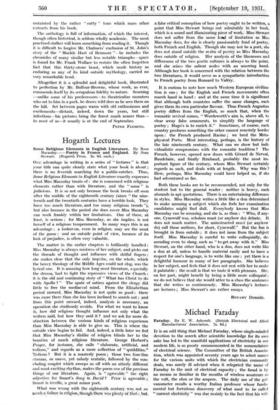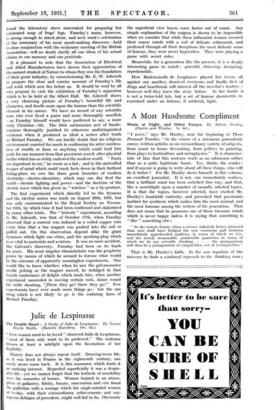Michael Faraday
IT is an odd thing that Michael Faraday, whose single-minded devotion to the search after scientific knowledge for its own sake has led to the manifold applications of electricity in our modern life, is so poorly commemorated in the nomenclature of electrical science. The Committee of the British Associa- tion, which was appointed seventy years ago to select names for the various units with which the electrician commonly deals, was surely ill advised when it relegated the name of Faraday to the unit of electrical capacity ; the farad is by no means so familiar in the mouths of wireless amateurs as the volt, the ohm or the ampere. The daily use of the gal- vanotheter recalls a worthy Italian professor whose funda- mental but fortuitous discovery of what use to be called " current electricity " was due mainly to the 'fact that his wife found the laboratory stove convenient for preparing her celebrated soup of frogs' legs. - Faraday's name, however, is strong enough to stand,alone, and next week's celebration of the centenary of his most epoch-making discovery—held in close conjunction with the centenary meeting of the British Association—will no doubt clarify all our ideas of his actual claims to our memory and our gratitude. •
It is pleasant to note that the Association of Electrieal and Allied Manufacturers have shown their appreciation of the earnest student of Nature to whom they owe the foundation of their great industry, by commissioning Mr. E. W. Ashcroft to prepare the clear and concise account of Faraday's life and work which now lies before us. It should be read by all who propose to visit the exhibition of Faraday's apparatus which is to be held at the Albert Hall. Mr. Ashcroft draws a very charming picture of Faraday's beautiful life and chaiacter, and dwells more upon the human than the scientific element in his career. We have no record of any scientific man who ever liyed a purer and more thoroughly unselfish —as Faraday himself would have preferred to say, a more truly Christian—life. The little antinomian sect of Sande- manians thoroughly justified its otherwise undistinguished existence when it produced so ideal a seeker after truth as Michael Faraday. We can hardly doubt that his religious environment counted for much in confirming his utter careless- ness of wealth, or fame or anything which could lead him aside for one moment from that persistent search after physical truths which has so richly endowed the modern world. " Facts are important to me," he wrote as a lad ; and to the unrivalled temper of mind which could track facts down in their farthest hiding-place we owe the three great branches of modern electricity—electro-chemistry, which may one day feed the world—electric lighting and power—and the doctrine of the electric wave which has given us " wireless " as a by-product.
The first experiment which directly led to the dynamo and the electric motor was made on August 2flth, 1881, but was only communicated to the Royal Society on Novem- ber 24th, by which time it had been confirmed and elaborated by many other trials. The " historic " experiment, according to Mr. Ashcroft, was that of October 17th, when Faraday observed that a current was induced in a coiled copper wire every time that a bar magnet was pushed into the coil or pulled out. On this observation depend alike the giant dynamos which light our cities, and the sparking-plug which is so vital to motorists and aviators. It was no mere accident, like Galvani's discovery. Faraday had been on its track for years. His most singular characteristic was the prophetic power by means of which he seemed to foresee what would be the outcome of apparently meaningless experiments. One would like to know whether, when he saw the galvanometer needle jerking as the magnet moved, he indulged in that boyish exuberance of delight which made him, when another experiment succeeded in moving certain rods, dance round the table shouting, ",There they go ! there they go !" Few experiments have ever made more things go : but the one thing which is not likely to go is the enduring fame of Michael Faraday.



































 Previous page
Previous page